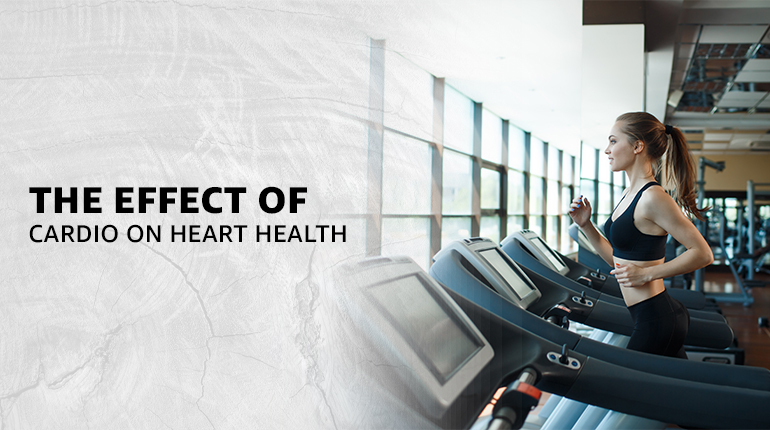The Effect & Importance of Cardio For Heart Health

Did you know heart disease is the leading cause of death globally? Luckily, there’s a powerful weapon you can wield in the fight for a healthy heart: cardio for heart health. From boosting circulation to lowering blood pressure, cardio offers a range of benefits to keep your ticker ticking strong.
Understanding Cardio: The Engine Gets Pumped
Cardio stands for cardiovascular exercise, and it’s all about getting your heart in the game! Any activity that elevates and maintains your heart rate for a sustained period falls under the cardio umbrella. When you engage in cardio, your body demands more oxygen. This triggers your heart to pump faster and stronger, delivering that oxygen-rich blood to your working muscles. Think of it as giving your heart a workout – the more you challenge it, the stronger and more efficient it becomes, leading to a cascade of benefits for your entire cardiovascular system.
Benefits of Cardio for Heart Health
Regular cardio exercise works wonders for your heart in several ways:
1. Strengthened Heart Muscle:
Just like any muscle, the heart responds to the demands of cardio by becoming stronger. This improved efficiency allows it to pump blood more effectively with each beat, reducing strain and lowering your resting heart rate.
2. Enhanced Blood Flow:
Cardio dilates your blood vessels, improving blood circulation throughout your body. This ensures your organs, including your heart, receive a steady supply of oxygenated blood for optimal function.
3. Reduced Blood Pressure:
Regular cardio is a natural blood pressure regulator. The improved blood vessel elasticity and efficient pumping action of a stronger heart contribute to lower blood pressure, a significant risk factor for heart disease.
4. Cholesterol Management:
Cardio helps maintain a healthy cholesterol profile. It increases HDL (good) cholesterol, which scavenges LDL (bad) cholesterol, preventing its buildup in arteries. This reduces the risk of plaque formation, a major cause of heart disease.
5. Weight Management:
Cardio burns calories, aiding in weight management. Maintaining a healthy weight reduces stress on the heart and lowers the risk of obesity-related heart complications.
6. Improved Blood Sugar Control:
Regular cardio enhances your body’s ability to utilize insulin, leading to better blood sugar control. This is particularly beneficial for people with prediabetes or type 2 diabetes, as high blood sugar can damage the heart.
7. Stress Reduction:
Cardio is a fantastic stress reliever. Physical activity triggers the release of endorphins, hormones that elevate mood and promote feelings of well-being. Lower stress levels translate to a reduced risk of high blood pressure and heart disease.
Activities for Every Heart
The beauty of cardio lies in its versatility. There’s an activity for everyone, regardless of age, fitness level, or preference. Here are some popular cardio options:
Running/Jogging:
A classic choice, running/jogging, whether outdoors or on a treadmill, strengthens your heart and lungs while offering a dose of nature therapy.
Also Read: Stair Climber Vs Treadmill: Conquering Cardio, Your Way
Brisk Walking:
Walking is a low-impact, accessible option that delivers significant heart benefits. It could easily be done in the comfort of your home for miles on a treadmill. Additionally, you can elevate the intensity by adding hills or incorporating walking lunges, outdoors.
Swimming:
Swimming is a full-body workout that’s gentle on your joints. The water’s resistance provides a challenging yet low-impact cardio experience.
Cycling:
Cycling is a fun and scenic way to get your heart rate up. It’s a low-impact option suitable for people with joint problems.
Dancing:
Put on your favorite tunes and dance your heart out! Dancing is a joyful way to elevate your heart rate and get your blood pumping.
Group Fitness Classes:
Zumba, HIIT (High-Intensity Interval Training), and aerobics classes offer a fun and social way to get your cardio fix.
The Art of Consistency: Making Cardio a Habit
For optimal heart health, aim for at least 150 minutes of moderate-intensity aerobic activity or 75 minutes of vigorous-intensity aerobic activity per week, as recommended by the American Heart Association. Consistency is key – even small doses of daily cardio add up. Start with manageable durations and gradually increase the intensity and duration as your fitness improves.
Additionally, while cardio is fantastic for your heart, it’s crucial to listen to your body. If you experience chest pain, dizziness, or difficulty breathing during exercise, stop immediately and consult your doctor. Always consult your doctor before starting a new exercise program, especially if you have any underlying health conditions.
Conclusion: Cardio: A Long-Term Investment in Your Heart’s Health
Making cardio a regular part of your life is one of the best investments you can make in your heart’s health. The numerous benefits translate to a stronger, more efficient heart, improved blood circulation, and a lower risk of heart disease. Remember, even small changes in your activity level can make a big difference. So lace up your shoes, put on your favorite music, and get your heart pumping.
Categories
Tags
Recent Posts

Top 10 Fitness Accessories You Didn’t Know You Needed
July 19, 2024
Treadmill vs. Running Outside: Which is Right for You?
July 13, 2024
DIY Treadmill Maintenance in Monsoon: Essential Checks to Keep It Running Smoothly
June 22, 2024
Best Treadmill Workouts for Weight Loss
June 14, 2024
